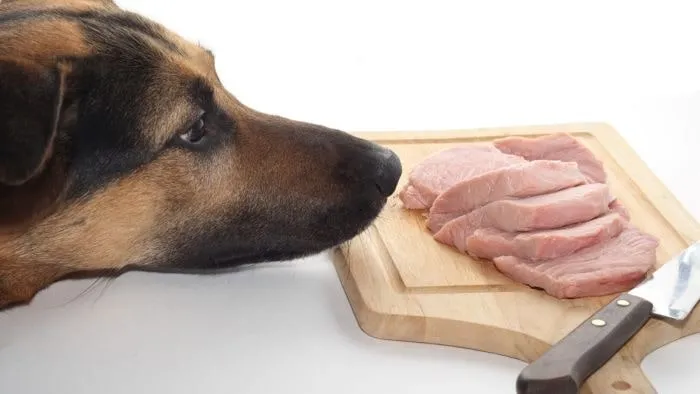Dogs are omnivores, meaning they can eat both plant and animal-based foods. While dogs can technically eat pork it is important to consider whether it is safe and nutritious for them to do so. The word “pork” refers to meat from pigs. The majority of us believe that pork is the same as other meats, which is why many dog owners might think, Can Dogs Eat Pork?
However, the types of pork and methods of consumption that we humans use may not be secure or healthful for your pet. In this article, we’ll take a closer look at the potential benefits, risks of feeding your dog pork, and answer can dogs eat pork?

Can Dogs Eat Pork?
Yes, dogs can eat pork. Dogs are known for their love of food, but not all food is safe for them to eat. As pet owners, it is important to be aware of what foods are toxic to our furry friends. One food that raises questions among pet owners is pork. Can dogs eat pork safely, or is it something they should avoid altogether?
Pork is a common ingredient in many human foods, but just because it is safe for us to eat doesn’t mean it is safe for dogs. When offered as part of a balanced and comprehensive diet, pork is an excellent and very appealing source of protein to give to your dog. In general, dogs can eat pork, but there are some precautions that need to be taken to ensure they don’t experience any adverse effects.
Possible Threats from Eating Raw Pork
The consumption of raw pork by dogs is not advised. According to petmd, Trichinella parasites, which can infect humans and dogs, may be present in raw or undercooked pork flesh. There is also a chance that toxic bacteria may be present. Pork should always be cooked before being given to your dog for these reasons. If your dog manages to eat raw pork, watch out for the following symptoms which could indicate a possible infection[1]:
- Diarrhoea
- Vomiting
- Upset Stomach
- Fever
- Lethargy
- Muscle stiffness
Benefits of Eating Pork for Your Dog
Following are a few benefits to feeding pork to your dog:
Good source of protein:
Pork is a good source of high-quality protein, which is essential for maintaining and repairing muscle tissue.
Essential nutrients:
Pork is rich in essential nutrients such as iron, zinc, and B vitamins which play a crucial role in maintaining a healthy immune system, skin, and coat.
Fat Content:
Pork is also a good source of fat, which can be beneficial for dogs that need to gain weight or maintain a healthy body condition.
It’s important to note that while pork can be a nutritious addition to your dog’s diet, it should be served in moderation and fully cooked to minimize the risk of foodborne illness. Additionally, it’s best to consult with your veterinarian to determine the right amount of pork to include in your dog’s diet taking into account their individual nutritional needs and health status.
Pork can provide carbohydrates to fuel your dog’s energy. However, it’s best to choose low-sodium options and avoid added sugars. If you want to add carbohydrates to your dog’s diet, consider healthier options like cornflakes for dogs.
Drawbacks of Eating Pork for Your Dog
Some of the demerits of serving pork to your dog:
Risk of Foodborne Illness:
Feeding raw or undercooked pork to your dog can be dangerous as it may contain harmful bacteria, such as Salmonella and E. coli, that can cause food poisoning in dogs.
Bone Fragments:
Bones in pork can splinter and cause injury to your dog’s digestive tract. It’s important to only feed your dog fully cooked, boneless pork.
High Fat and Sodium Content:
Pork can be high in fat and sodium, which can contribute to health problems such as obesity, high blood pressure, and pancreatitis if fed in excess.
Unbalanced Diet:
Feeding your dog too much pork can lead to an imbalanced diet, as it does not provide all of the essential nutrients that dogs need for optimal health.
It’s important to consult with your veterinarian to determine the right amount of pork to include in your dog’s diet, taking into account their individual nutritional needs and health status.
How Can You Serve Pork to Your Dog?

Feeding pork to your dog can be a healthy addition to their diet, as long as it is done safely and in moderation. Here are some steps to follow when feeding pork to your dog:
Choose lean cuts:
Choose lean cuts of pork, such as pork loin or tenderloin, rather than fatty cuts like bacon or ham. Fatty cuts can lead to weight gain and other health issues in dogs.
Cook thoroughly:
Cook the pork thoroughly to kill any harmful bacteria that may be present. Boiling or baking are both safe cooking methods.
Remove bones:
Remove any bones from the pork before giving it to your dog. Pork bones can splinter and cause damage to your dog’s digestive system.
Cut into small pieces:
Cut the pork into small pieces, making it easier for your dog to eat and digest.
Serve in moderation:
Pork should only be served as a treat or supplement to your dog’s regular diet and in moderation. Overfeeding your dog can lead to weight gain and other health issues.
Introduce gradually:
If your dog has never had pork before, introduce it gradually into their diet to avoid any digestive upset.
Observe your dog for any signs of adverse reactions, such as vomiting, diarrhoea, or abdominal pain. If you notice any issues, stop feeding your dog pork and consult with your veterinarian. By following these steps, you can safely and successfully feed pork to your dog. As with any new food, it is always best to consult with your veterinarian to ensure it is appropriate for your dog’s individual dietary needs.
The same care should be taken when preparing and serving fish to dogs. Be sure to cook fish thoroughly and remove all bones. For more detailed guidance, check our guide on can dogs eat fish for more information.
FAQs
How much pork can a dog eat?
Initially, observe your dog for any signs of adverse reactions, such as vomiting, diarrhoea, or abdominal pain. If you notice any issues, stop feeding your dog pork and consult with your veterinarian. If your dog does not show any adverse effects, you can add pork to your dog’s regular diet.
Do dogs get worms from eating pork?
Trichinellosis, also known as trichinosis, is a parasitic food-borne disease that is caused by eating raw or undercooked meats, especially pork products infested with the roundworm called Trichinella.
Is beef or pork better for dogs?
Pork has much more fat than beef, and relatively has the same amount of protein as beef. This makes pork a great addition to the dog’s diet to gain weight.
Can dogs eat pork bones?
Cooked pork bones are fragile, meaning that small pieces can very easily break off and get stuck in your dog’s throat or damage its internal organs.
Raw pork bones are less fragile, but there’s still a risk of breaking and a range of other problems, so it’s not recommended to feed them.
Conclusion
So, Can dogs eat pork? To sum it up, Yes, dogs can safely eat pork. Although, it is important to take safety measures such as ensuring that the pork is cooked thoroughly to kill any harmful bacteria, choosing lean cuts, and avoiding processed pork products. Feeding your dog only small amounts of pork will help to ensure they stay healthy and happy.
As with any new food, it is always best to introduce it gradually and monitor your dog for any signs of adverse reactions. If you have any concerns about feeding your dog pork, it is always best to consult with your veterinarian.
Ever wonder if you can give pups hotdogs? For more advice on feeding hotdogs, see our article on can puppies eat hot dogs?
References:
- PetMD Editorial. (2022c, August 16). Pork Roundworm Infection in Dogs. PetMD.



